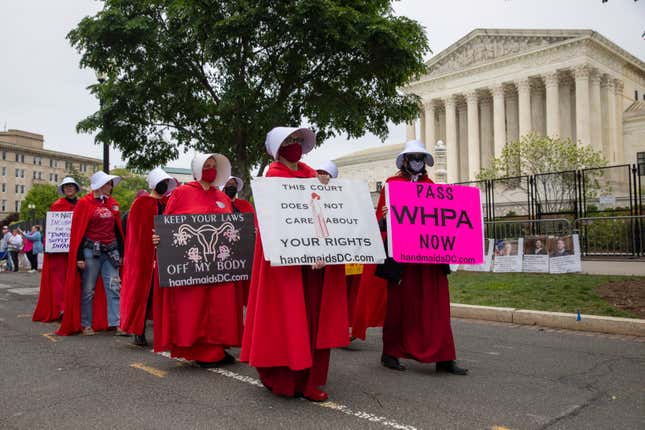
Confession time, I’m not a fan of the Handmaid’s Tale. Partially, that’s because I prefer the central conflict in my television shows to be about who got invited to Karen’s wig party or whose leopard Cartier ring is bigger.
But I’d have to be living under a rock if I wanted to avoid people saying, “I feel like we’re all about to be living in The Handmaid’s Tale.” And, it’d be hard to miss the women draped in bright red robes protesting abortion restrictions outside of state capitals.
And I get it the Supreme Court seems poised any day now to get rid of decades of precedent protecting the right to an abortion. We’re all in scary uncharted territory, and I cover these issues for a living.
Except here’s the catch about using the show as your symbol of resistance. The Handmaid’s Tale and its source material rip nearly every single horror that befalls its predominantly white cast from the real-life stories of oppression of Black and Brown women. A fact Margaret Atwood, the author of the book the show is based-on, readily admits.
One of the first things we learn about the world of the Handmaid’s Tale is that ostensibly to solve population decline, fertile women are raped and forced to give birth against their will. Those children are then ripped from their mother’s arms sorts and given to their master’s families.
In the show, most of the women we see this happening to are thin white women. But, specific rationale aside, all of these horrors were central to the chattel slavery system in the United States.
Here’s an excerpt from an abolitionist and former slave, Henry Bibb’s account of a mother and her child being separated at slave auction:
She pleaded for mercy in the name of God. But the child was torn from the arms of its mother amid the most heart rending-shrieks from the mother and child on the one hand, and bitter oaths and cruel lashes from the tyrants on the other. Finally the poor little child was torn from the mother while she was sacrificed to the highest bidder. In this way the sale was carried on from beginning to end.
Even today, bodily autonomy is hardly a right guaranteed to all Black women. As recently as 2018, a Black Mississippi woman, Latice Fisher, was indicted on second-degree murder charges after delivering a stillborn baby.
And it’s difficult to argue that we as Black women truly have reproductive choices when the journey to motherhood is so much more perilous for us than our white peers.
The central horror and conceit of the Handmaid’s Tale is what if all of the bad things that happened to “those people” happened to white middle-class American women instead.
That’s why telling Black women that we need to watch a show where our histories of trauma are humanized through the lens of mostly white actors to understand what comes next is, at best, a little unhelpful.

